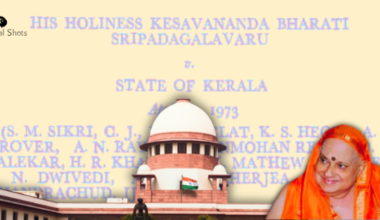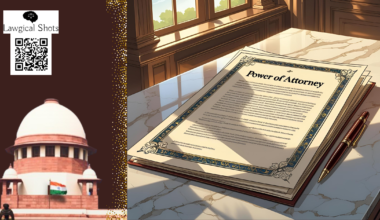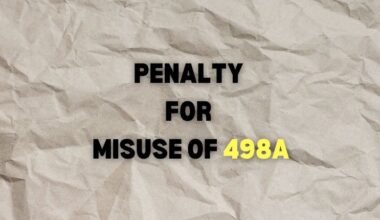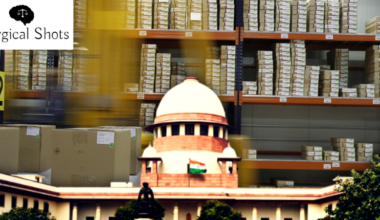Can a government servant be held guilty of bribery if he accepts money on the instructions of another? Is demand by one person and acceptance of illegal gratification by another enough to convict both the persons involved? The Supreme Court case on demand and acceptance of bribe answered this crucial question in A. Karunanithi v. State case. This case is dealt with under the Prevention of Corruption Act, 1988 (PC Act). The Act serves as a special law dealing with offences committed by public servants. Its aim was to maintain dignity, transparency, and integrity in public administration by punishing those who misuse their official position for personal gain. Let’s see how the legal picture changes in A. Karunanithi v. State.
Main Provisions on Demand and Acceptance of Bribe
- Section 7 – Public servant taking gratification other than legal remuneration.
This section deals with the offence made by any public servant who demands or accepts any bribe other than their legal pay. The Act is punishable even if a person merely agrees to accept or attempts to obtain such a bribe. Such a person shall be punishable for a minimum of 3 years, which may extend to 7 years plus a fine.
- Sec 13(1)(d) read with sec 13(2) – Criminal Misconduct
This section deals with criminal misconduct by a public servant. It says if any public servant abuses his position to obtain any undue advantages for himself or for someone else, he is liable to commit criminal misconduct for which he can be punished for a minimum of 1 year, up to 7 years of rigorous imprisonment, plus a fine.
- Sec 20 – Presumption as to acceptance of gratification
This provision shifts the burden of proof; it says if a public servant accepts any gratification as a bribe, unless the accused proves otherwise. The court will presume that it was taken as a bribe, unless the accused proves otherwise. However – this presumption applies only when there is clear & certain demand & acceptance established.
Background of Karunanithi v. State
The case started in 2004 in a small village in Tamil Nadu, Selvalur. The main accused was the Village Administrative Officer while another accused was working as a Village Assistant. The complainant applied to the Tehsildar for a Community Certificate he needed for joining Government Service. The said application was returned directing to approach the Village Administrative Officer for a report. However, the Village Administrative Officer (main accused) demanded ₹500 as bribe for processing the certificate which was repeated on second attempt. This led the complainant to approach the Vigilance & Anti-Corruption Department.
The police organised a trap and gave the complainant a ₹500 note treated with phenolphthalein powder (a chemical that turns pink when touched and washed).
As planned, the complainant met the main accused who repeated his demand and instructed to hand over the money to the Village Assistant. The police team rushed in and recovered the notes, his hands turned pink in the chemical wash test, confirming he had handled the marked currency. Both officers were booked under Sections 7 and 13 of the Prevention of Corruption Act, 1988.
The Special Court convicted both the accused persons. The main accused was A-1 was sentenced to 3 years RI & a ₹10,000 fine under Sec 13(1)(d) r/w 13(2) and 2 years RI & a ₹5,000 fine under Sec 7. The other accused was sentenced to 1.5 years RI & a ₹2,000 fine under Sec 13(1)(d) r/w 13(2) and 1 year RI & a ₹2,000 fine under Sec 7. The High Court upheld the trial court decision, dismissed the appeal, and confirmed the conviction.
Legal Issues Before Supreme Court
- Whether demand & acceptance of a bribe are both necessary for conviction?
- Whether the other accused, who merely followed the instructions of his senior, is liable for acceptance of bribe?
- Whether punishment can be reduced considering the small amount of bribe (₹500) and long pendency (21 years)?
Supreme Court on Demand and Acceptance of Bribe
The Supreme Court acquitted A-2 by stating that he never demanded illegal gratification. He was merely following A-1’s instructions.
The court referred to Neeraj Datta v. State 2023, wherein it was held that an offence is proved only when a clear and certain demand took place and the same is accepted. The Prosecution has to prove demand and acceptance of illegal gratification for conviction under Sections 7 and 13 of PC Act. Demand and acceptance are sine qua non (absolutely essential) for the conviction.
The Court hinted that merely accepting bribe money is not enough unless a demand is proved. Therefore, the Court found that there was nothing material against the other accused to prove that he was a habitual offender aiding the main accused. In the absence of allegation or evidence of demand on his part, the other accused could not be prosecuted for demanding and receiving illegal gratification.
The court went on to Mahendra Singh Chotelal Bhargad v. State of Maharashtra (1997) where a bribe was demanded by one person and was accepted and recovered from a third person. The Court highlighted that the third person’s conviction was set aside since there was no charge of abetment.
While in the case of the main accused, the demand of a bribe was proved on two occasions, and acceptance took place through the other accused. Therefore, the conviction was upheld, but the sentence was reduced from 3 years to a minimum of 1 year, considering the petty amount and 21 years’ delay. The Court justified the reduction of sentence stating that it was within the scope of statute which provided the minimum sentence of 1 year.
Conclusion
This judgement clarifies that in corruption cases, demand and acceptance must be proved for the purpose of conviction. At the same time, the court reducing the sentence by considering the small bribe and long delay reflects that even for petty offences, years of delay should be considered while deciding cases.
The Supreme Court judgment on demand and acceptance of bribe is analysed by our intern, Ms Himani Gill. She has been assisting the team in bringing informational legal blogs.








